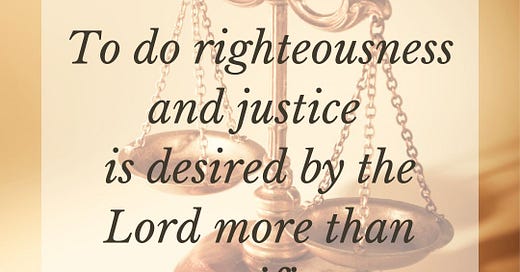'
TDW Stack | NEWSLETTER | March 28
Hello!
You are receiving this because you joined The Diligent Woman newsletter. I’ve recently moved to sending this via Substack. This should come straight to your Inbox, unless you have gone into your Substack settings and changed your notifications. You do have this option. You can choose to only get things via the app, you can choose to get them only in your Inbox, or you can do both. Bonus is you can always come back to The Diligent Woman Substack to find previously sent emails and other posts that you may have missed.
Failing to Learn the Lesson
Matthew 23:34-36
“Therefore, behold, I am sending you prophets and wise men and scribes; some of them you will kill and crucify, and some of them you will scourge in your synagogues, and persecute from city to city, so that upon you may fall the guilt of all the righteous blood shed on earth, from the blood of righteous Abel to the blood of Zechariah, the son of Berechiah, whom you murdered between the temple and the altar. Truly I say to you, all those things will come upon this generation.”
The Jews of Jesus’ day had a learning problem. They simply would not learn from the history of their own people.
Matthew 23 (and Luke 11) contains a speech Jesus gives to the crowd about the failures of their spiritual leaders. These leaders set themselves in place of Moses by adding to and re-interpreting the law Moses had been given by God. In verse 4 He says, “They tie up heavy burdens and lay them on men’s shoulders, but they themselves are unwilling to move them with so much as a finger.”
The scribes and Pharisees were guilty of making it harder for people to be obedient to the Lord! Their motivation was to build a reputation in the eyes of men; they weren’t worried about what God thought. Their actions showed they didn’t really expect God to show up in any significant way.
As Solomon says in the book of Ecclesiastes, “there is nothing new under the sun” (Eccl. 1:9).
Last week we talked about the danger of becoming stagnant in our faith.Those in Zephaniah’s day had come to believe that God would respond to them with neither “good or evil”. Sound familiar? The Jews in the first century were behaving the same way!
Let’s see if we can find some more examples of the same lesson pattern.
The Lesson is Repeated Throughout History
Judah in the days of Micah
We get a glimpse of God teaching Judah about needing to learn from history in the prophets.Let’s look at Micah for a minute. In Micah 6 God gives Micah a vision to share with the people. In this message, God is being both advocate and judge for the people. He is pleading their case and declaring their indictment before the mountains (Micah 6:1-2). After explaining how the Lord God has always worked to make their burdens lighter, the picture shows the accused asking “what else can we do?”
Here is what the accused thought could be offered:(Micah 6:6-7)
Burnt offerings, better yet with yearling calves?
Or instead, thousands of rams?
What about ten thousand rivers of oil?
Or, maybe sacrifice my firstborn for my rebellious acts? The fruit of my body for the sin of my soul.
The accused acts as though they’ve already done enough. They act as though God is demanding too much of them. They CANNOT do more than what they’ve done, because all of the offerings beyond the first are more than any person could afford or accomplish in a lifetime.
See God’s answer in Micah 6:8:
“He has told you, O man, what is good; And what does Yahweh require of you but to do justice, to love lovingkindness, and to walk humbly with your God?” (LSB)
The accused was looking to earthly efforts to correct his problem. God said He wants men to be just toward one another, love lovingkindness (can you hear Psalm 136?), and walk humbly with God.
In the beginning with Cain and Abel
Go back to the beginning. Read Cain’s story in Genesis 4. What was the problem? Did God take issue with Cain’s sacrifice or was it his attitude about it? Three things show us his attitude was what resulted in a sacrifice that was not accepted by God.
In Gen. 4:7 God says that Cain’s desires will move him to “not do well” and Cain needs to master those desires.
Hebrews 11:4 says that Abel’s actions were driven by his faith, the implication being that Cain’s actions were NOT driven by faith.
1 John 3:12 tells us Cain “was of the evil one”. His deeds were evil and his brother’s were righteous.
Cain wasn’t offering sacrifices because he was trying to walk with God. His lack of humility when called out by God proves that. He wanted what he chose to offer to be counted as good enough because he offered it. Abel was focused on a better country (Heb. 11:16) and Cain was focused on his status in his earthly life.
What was God’s answer to Cain’s problems? “If you do well, will not your countenance be lifted up? And if you do not do well, sin is crouching at your door; and its desire is for you, but you must master it.” (Gen. 4:7). Cain needed to master whatever was inside of him that was willing to follow what was not good instead of doing the right thing.
Let’s look at one more.
The Destruction of King Saul’s Legacy
In 1 Samuel 15 we have the time when King Saul fails to obey God’s commands about destroying Amalek.
God shares why He wants Amalek destroyed - because this is their punishment for how the Amalekites treated Israel when they came out of Egypt and were on their way to Canaan (1 Sam. 15:2). Saul is meant to be acting as God’s sword of retribution, but Saul has other ideas.
Saul defeats the Amalekites in battle, but he chooses to save King Agag and the best of “all that was good” (1 Sam. 15:9). He and the people “were not willing to destroy them utterly”. See? - “not willing” equals a heart problem that created an action that was a problem.
King Saul then proceeds to build a monument to himself and go on his merry way.
When confronted by Samuel about the noise from “all that was good”, Saul says, “but the people wanted to make a sacrifice to the Lord your God”; “but the rest we have utterly destroyed.” Not only does Saul claim to believe he has obeyed God (1 Sam. 15:13, 20-21) he doesn’t hesitate to blame the people and make excuses when his wrong is pointed out - twice.
Their desire to make a sacrifice to God did not negate the disobedience in how they acquired the sacrifice.
Samuel knows their heart wasn’t right (1 Sam.15:17-19). The lesson Saul and the people weren’t getting was that God wants people with a heart for obedience more than sacrifices of “all that was good”.
The thing is, this is the second time Saul has failed to learn this lesson! Back in 1 Samuel 13 Saul wanted to make a sacrifice to calm the fears of the people and keep his army around him for the next fight(1 Sam. 13:5-9). Instead of waiting for Samuel to show up, Saul offered the sacrifice himself! His disobedience lost him a lasting legacy of kings of his household. The second offense caused him to lose being king himself.
See The Thread Throughout History
Pull on the thread these stories have in common.
In all instances the people were people who offered worship to God and justice was missing from their interactions with their fellow man. Israel would repeat this pattern over and over again in their history, and we still do it today.
The people in the stories wanted what they chose to offer to God to be enough. They did not take into consideration what God actually wanted from them.
Cain and Abel both came to sacrifice to God. Abel did so by faith and was counted as righteous, Cain did not.
King Saul led the people in offering sacrifices because of what they wanted in the moment. They decided what was good to offer to God - even though He had already declared He wanted everything destroyed. God saw nothing “that was good” in the spoils from the defeat of Amalek. They were fruits of sin, not firstfruits to be offered for sacrifice.
By the time of the prophets, over and over again God tells them He cannot stand their sacrifices because their lack of obedience in other things makes the sacrifices meaningless. When you have time, take a walk through these references and see how long the thread of obedience and justice grows between them all.
Isaiah 1:10-17 What does God want from them?
Learn to do good; Seek justice, reprove the ruthless, defend the orphan, plead for the widow.
Jeremiah 7:16-26 What did God want from them?
But this is what I commanded them, saying,”Obey My voice, and I will be your God, and you will be My people; and you will walk in all the way which I command you, that it may be well with you.”
Hosea 6:1-11 What did God want from them?
For I delight in loyalty rather than sacrifice, and in the knowledge of God rather than burnt offerings.
Amos 5:21-23 What did God want from them?
“But let justice roll down like waters and righteousness like an ever-flowing stream.”
Micah 6:1-8 What did God want from them?
“He has told you, O man, what is good; and what does the Lord require of you but to do justice, to love lovingkindness, and to walk humbly with your God?”
The book of Zephaniah Yes, the whole book. It’s only three chapters. What did God want from them?
Zephaniah 2:3; “Seek the Lord, all you humble of the earth who have carried out His ordinances; Seek righteousness, seek humility. Perhaps you will be hidden in the day of the Lord’s anger.”
This is just a handful of references from the prophets! There are many more. (Hmm, I sense a scripture writing plan building here.)
Do you see the lesson they all failed to learn?
The Lesson That Still Matters
Fortunately, there are examples of people who did get it and they shared the secret with us in positive ways.
In Psalm 51:14-17 David understood that, “The sacrifices of God are a broken spirit; a broken and contrite heart, O God, You will not despise.”
Proverb 21:2-3 declares the lesson this way, “Every man’s way is right in his own eyes, But the Lord weighs the hearts. To do righteousness and justice is desired by the Lord more than sacrifice.”
The scribes and Pharisees Jesus was talking about were ones who had failed to learn the lesson (Mt. 23:23). One scribe, though, was able to understand it, and Jesus said this knowledge meant he was “not far from the kingdom of God”.
After Jesus declares the two commandments that are foremost in Mark 12:28-31, one scribe agrees and sums up his understanding this way;
…”He is One, and there is no one else besides Him; and to love Him with all the heart and with all the understanding and with all the strength, and to love one’s neighbor as himself, is much more than all burnt offerings and sacrifices.”
Actions do matter, of course, but they matter more when they reflect what’s going on in your heart. God wants them to reflect a love for Him and a desire to show it to others.
Now, what will you do with the lesson?
Other things to check out from The Diligent Woman:
Season 5 of The Diligent Woman Podcast has begun!
Find Episode 503 here
If you prefer a video version, you can see it here









